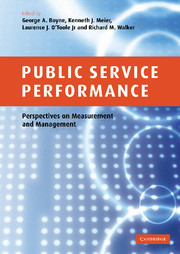Book contents
- Frontmatter
- Contents
- List of figures
- List of tables
- Notes on contributors
- 1 Introduction
- 2 Subjective and objective measures of organizational performance: An empirical exploration
- 3 All measures of performance are subjective: More evidence on US federal agencies
- 4 A qualitative evaluation of public sector organizations: Assessing organizational performance in healthcare
- 5 Quantitative approaches towards assessing organizational performance
- 6 Consequences of goal ambiguity in public organizations
- 7 Performance control and public organizations
- 8 Bureaucratic red tape and organizational performance: Testing the moderating role of culture and political support
- 9 All that glitters is not gold: Disaggregating networks and the impact on performance
- 10 Network evolution and performance under public contracting for mental health services
- 11 The design and management of performance-based contracts for public welfare services
- 12 Outsourcing government information technology services: An Australian case study
- 13 International comparisons of output and productivity in public service provision: A review
- 14 Public management and government performance: An international review
- 15 What drives global e-government? An exploratory assessment of existing e-government performance measures
- 16 Public management and organizational performance: An agenda for research
- Index
- References
3 - All measures of performance are subjective: More evidence on US federal agencies
Published online by Cambridge University Press: 22 September 2009
- Frontmatter
- Contents
- List of figures
- List of tables
- Notes on contributors
- 1 Introduction
- 2 Subjective and objective measures of organizational performance: An empirical exploration
- 3 All measures of performance are subjective: More evidence on US federal agencies
- 4 A qualitative evaluation of public sector organizations: Assessing organizational performance in healthcare
- 5 Quantitative approaches towards assessing organizational performance
- 6 Consequences of goal ambiguity in public organizations
- 7 Performance control and public organizations
- 8 Bureaucratic red tape and organizational performance: Testing the moderating role of culture and political support
- 9 All that glitters is not gold: Disaggregating networks and the impact on performance
- 10 Network evolution and performance under public contracting for mental health services
- 11 The design and management of performance-based contracts for public welfare services
- 12 Outsourcing government information technology services: An Australian case study
- 13 International comparisons of output and productivity in public service provision: A review
- 14 Public management and government performance: An international review
- 15 What drives global e-government? An exploratory assessment of existing e-government performance measures
- 16 Public management and organizational performance: An agenda for research
- Index
- References
Summary
Introduction
This chapter has twin aims. First, I address the important matter of measuring organizational performance and argue that it is a socially-constructed concept; thus, all measures of performance are subjective. I then propose a framework to evaluate such measures. This framework consists of three criteria: validity, reliability, and sensitivity. A perceptual measure of organizational performance is introduced, and this measure is shown to satisfy these criteria as well or better than most measures. However, perceptual measures are vulnerable to common source and related bias. Two ways to assess the viability of this threat are suggested and demonstrated.
Second, this perceptual measure of organizational performance is utilized in an empirical analysis. I test a hybrid model that predicts organizational performance in the twenty-two largest federal agencies using data from the 2000 Merit Principles Survey, US Merit Systems Protection Board. This model features supervisory management and several related constructs as prominent variables. The findings show that management matters a great deal. Frontline supervisors play an important role in organizational performance, and supervisory management is an important determinant of high performance in federal agencies. High performing agencies also tend to have skillful upper-level managers, strong cultures that value employees and emphasize the importance and meaningfulness of the agency's work, and policies that empower those employees. These agencies also tend to have a strong performance orientation, and they strive for workforce diversity.
- Type
- Chapter
- Information
- Public Service PerformancePerspectives on Measurement and Management, pp. 35 - 54Publisher: Cambridge University PressPrint publication year: 2006
References
- 68
- Cited by



